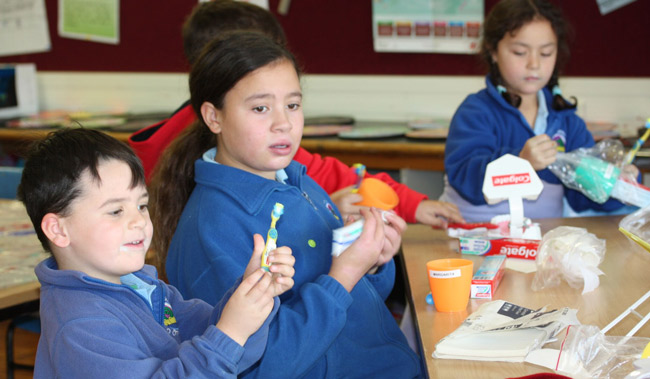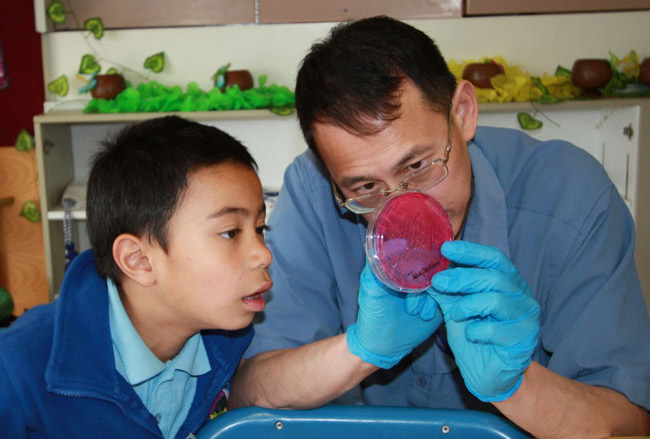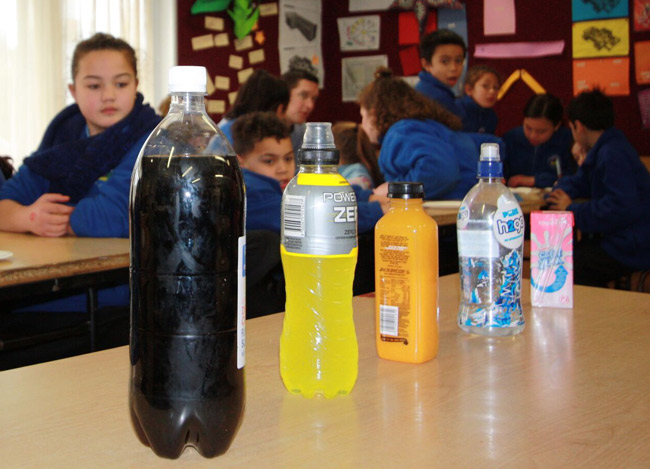
Pupils of Dunedin's Te Kura Kaupapa Māori o Ōtepoti have brushed their teeth every day at school as part of an Otago outreach programme. Photos: Dr Carolina Loch.
A seven-month outreach project led by Otago's Faculty of Dentistry is helping to educate primary school aged children about healthy food choices and good oral hygiene.
The Sugar in your diet: kino te pai project has seen staff and postgraduate students from both Dentistry and Human Nutrition work with Dunedin's Te Kura Kaupapa Māori o Ōtepoti staff, pupils and their whānau to investigate the hidden sugar content in their diet and how pupils can improve their oral health.
Each month the team visits with a science experiment to help the pupils discover the effects of sugar on teeth and their general health, and in parallel, a tooth brushing and oral hygiene intervention has also been implemented – with the children brushing their teeth every day at school.

Pupils have enjoyed the science experiments teaching them more about the effects of sugar on their teeth.
Dentistry's Dr Carolina Loch says the small school, located in the Dunedin suburb of Fairfield, has a predominantly Māori student base, making it an excellent school to work with on this project.
“In New Zealand in general, Māori children have less opportunity to engage with science and technology, have higher rates of obesity and diabetes, have poorer oral health and are more likely than other people to have tooth fillings or extractions due to poor oral hygiene. Our project is a good way to tackle some of these issues,” she says.
Through the project children have learned about the nutritional information labels and how to read the amount of sugar contained in a certain product.
“Physically weighing the sugar content and placing it in plastic bags was an eye opener for the kids,” Dr Loch says. “They were also surprised on the amount of physical activity required to “burn” the calories contained in certain foods. For example, they had to run around the school grounds for 10min to use the energy content of only one apple. Kids were also impressed with the sugar content of “so-thought” healthy products such as fruit juices, smoothies and sports drinks.”

Experiments included looking at the amount of sugar in drinks and the impact of acid on teeth.
Experiments on the acidic nature of certain drinks were also interesting to the pupils, she says.
“If you chose a sugar-free or diet version of a fizzy drink, for example, it is still acidic and this can cause all sorts of dental problems.”
The project, funded by the Otago Participatory Science Platform, is expected to end next month, with a hui planned with the project team and school staff, pupils and their whānau.
The team has been made up of Dr Loch, Professor Richard Cannon, Associate Professor Lyndie Foster Page, Dr Nick Heng and Ms Deanna Beckett of Dentistry, together with Dr Lisa Te Morenga of Human Nutrition. Postgraduate and undergraduate students from both departments have been involved.
